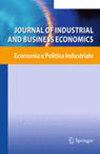区域贸易协定中全球价值链参与的决定因素:以区域全面经济伙伴关系(RCEP)为例
IF 2.5
Q2 ECONOMICS
引用次数: 0
摘要
在全球范围内,全球价值链贸易目前占贸易总额的70%左右。在区域全面经济伙伴关系(RCEP)区域,全球价值链贸易约占贸易总额的46%。此外,RCEP是中国、日本和韩国之间的第一个协议。鉴于日本、中国、韩国和越南等RCEP成员国在亚洲工厂和全球价值链组装中心的重要地位,本文采用固定效应回归方法,对1995-2018年期间RCEP集团中全球价值链参与的决定因素进行了研究。本文还探讨了成员国发展水平对全球价值链参与的影响。采用经合组织Tiva提供的最新全球价值链衡量标准,2021年版。贸易开放程度和经济自由度对RCEP成员国的后向参与率有正向影响,FDI流入对RCEP成员国的前向参与率有负向影响。然而,区域全面经济伙伴关系内的发展中国家似乎从外国直接投资流入中受益,因为与发达国家相比,外国直接投资流入显著影响了它们正向的远期参与率。同样,相对于发达国家,贸易开放对落后参与的积极影响在具有发展中国家地位的RCEP成员国中更为明显。本文章由计算机程序翻译,如有差异,请以英文原文为准。
Determinants of global value chain participation in regional trade agreements: the case of Regional Comprehensive Economic Partnership (RCEP)
Globally, the share of Global Value Chain (GVC) trade currently accounts for around 70% of total trade. In Regional Comprehensive Economic Partnership (RCEP) region, around 46% of the total trade involves GVC trade. Besides, RCEP is the first agreement between China, Japan and South Korea. Given the important positioning of RCEP member countries like Japan, China, South Korea and Vietnam in factory Asia and prominent GVC assembly hubs, this paper examines the determinants of GVC participation in RCEP bloc by employing fixed effects regression method over a period of 1995–2018. The paper also explores the impact of the level of development of the member countries on GVC participation. Latest GVC measures provided by OECD Tiva, 2021 edition are used. The degree of openness to trade and economic freedom positively impacts backward participation rate whereas FDI inflows exerts negative influence on forward participation rate of RCEP countries. However, the developing countries within RCEP appears to have benefitted from FDI inflows, as it significantly affects their forward participation rate in positive direction in relation to their developed counterparts. Similarly, the positive impact of trade openness on backward participation is more pronounced in RCEP member countries with a developing country status relative to developed countries.
求助全文
通过发布文献求助,成功后即可免费获取论文全文。
去求助
来源期刊

Journal of Industrial and Business Economics
Economics, Econometrics and Finance-Economics, Econometrics and Finance (all)
CiteScore
8.00
自引率
0.00%
发文量
31
期刊介绍:
This peer-reviewed journal, established in 1973, uses the lenses of industrial and business economics to investigate issues relevant to scholars, managers and policy makers.
The key areas of interest of JIBE are: industrial organization and policy; international business and international economics; innovation and entrepreneurship; corporate governance and finance.
Within these key areas, JIBE pays special attention to topics relating to grand challenges in a transforming world. A non exhaustive list of current issues includes: emergent technologies and industry dynamics; the digitalization of industries and financial markets; evolving multinationals and global value chains; environmental change and green transition; sustainable development of emerging economies; competition, regulation and structural policies in the platform economy.
JIBE welcomes papers that combine advancements in the theoretical understanding of phenomena with rigorous, systematic and original evidence-based empirical analysis, using quantitative or qualitative approaches as well as experimental and mixed methods. The journal is open to industry-, firm- and individual-level analyses, while the geographic scope may vary from subnational regions to nations and supra-national contexts, with a particular consideration of the EU and other integration processes.
The journal also publishes special issues and symposia aimed at opening debate among scholars on specific topics and discovery-type papers on emerging issues in industrial and business economics.
The journal is owned by the Associazione Amici di Economia e Politica Industriale.
 求助内容:
求助内容: 应助结果提醒方式:
应助结果提醒方式:


